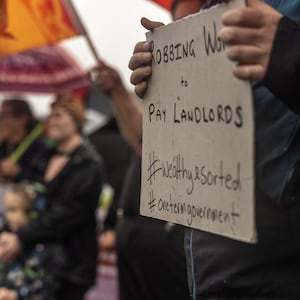Politics
Government Moves to Criminalize Disruptive Protests at Homes

The government is set to introduce a new legal offence aimed at curtailing disruptive protests occurring outside private residences. This announcement comes as reports of such demonstrations have notably increased, particularly outside the homes of Members of Parliament (MPs), judges, and various public officials. Justice Minister Paul Goldsmith emphasized the need for this measure, stating it aims to protect citizens from intrusive behaviour while still preserving the public’s right to demonstrate in a reasonable manner.
Under the proposed law, several factors will be taken into account when determining whether a protest is considered disruptive. These include the time of day, the duration of the protest, the actions of the demonstrators, noise levels, and the distance from the premises being protested. Goldsmith remarked, “The public’s ability to demonstrate is a cornerstone of our free and democratic society. It is a key way for citizens to express themselves and engage in political activity.”
Response to Concerns
The introduction of this new offence is largely a response to mounting concerns from public officials who have faced increased scrutiny and disturbances at their homes. Goldsmith noted that while the government fully supports the right to peaceful protest, there must be limits to ensure the safety and comfort of individuals in their own residences.
“We understand that the right to protest is vital. However, it should not come at the expense of an individual’s peace and security in their own home,” he added. This initiative seeks to strike a balance between upholding democratic freedoms and maintaining a respectful environment for all citizens.
The proposed legislation is expected to undergo discussions in Parliament, allowing for further scrutiny and input from various stakeholders. Should it pass, it could reshape the landscape of public demonstrations and the rights of citizens to express dissent.
Goldsmith concluded by affirming the importance of protecting public officials from harassment while still allowing for constructive dialogue and protest. The government aims to implement this law by March 2024, marking a significant step in addressing the escalating tensions surrounding protests in residential areas.
As discussions move forward, many will be watching closely to see how this legislation will be framed and the potential implications for both demonstrators and those being protested against.
-

 World3 months ago
World3 months agoTest Your Knowledge: Take the Herald’s Afternoon Quiz Today
-

 Sports3 months ago
Sports3 months agoPM Faces Backlash from Fans During Netball Trophy Ceremony
-

 Lifestyle3 months ago
Lifestyle3 months agoDunedin Designers Win Top Award at Hokonui Fashion Event
-

 Sports3 months ago
Sports3 months agoLiam Lawson Launches New Era for Racing Bulls with Strong Start
-

 Lifestyle3 months ago
Lifestyle3 months agoDisney Fan Reveals Dress Code Tips for Park Visitors
-

 Health3 months ago
Health3 months agoWalking Faster Offers Major Health Benefits for Older Adults
-

 World3 months ago
World3 months agoCoalition Forms to Preserve Māori Wards in Hawke’s Bay
-

 Politics3 months ago
Politics3 months agoScots Rally with Humor and Music to Protest Trump’s Visit
-

 Top Stories3 months ago
Top Stories3 months agoUK and India Finalize Trade Deal to Boost Economic Ties
-

 Entertainment3 months ago
Entertainment3 months agoExperience the Excitement of ‘Chief of War’ in Oʻahu
-

 World3 months ago
World3 months agoHuntly Begins Water Pipe Flushing to Resolve Brown Water Issue
-

 Science3 months ago
Science3 months agoNew Interactive Map Reveals Wairarapa Valley’s Geological Secrets









